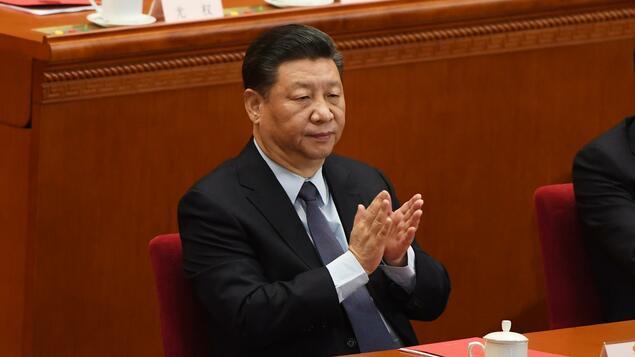Even before the corona crisis, China's head of state and party leader Xi Jinping was certain that the development of blockchain technology would be of fundamental importance for his country. In a speech last fall, Xi instructed the country's ministries and agencies to focus more on blockchain technology in the future. Xi said China will invest more in this area. Previously, he had personally chaired a study session on the development of this industry.
The message was so clear that several companies whose business core is in big data, connected industry and information technology, were subsequently suspended from trading on the Shanghai and Shenzhen stock exchanges for a short time as their stocks surpassed the maximum daily growth limit . As a result, the value of the digital coin Bitcoin rose by more than 25 percent to $10,000 after Xi’s announcement.
Digital policy, regulation, artificial intelligence: the briefing on digitization & AI. For decision-makers and experts from business, politics, associations, science and NGOs.
Free test now!
There is fierce international competition for cryptocurrencies. Facebook's announcement last year that it would launch its own currency, Libra, later this year spurred Beijing even more to develop and deploy its own cryptocurrency.
Counter-concept to Bitcoin
But Beijing does not want to jump on the bitcoin bandwagon, whose inventor Satoshi Nakamoto comes from Japan. China is pursuing a counter-concept to the existing blockchain currencies. After the Chinese government initially banned trading in Bitcoin in autumn 2017, it has been taking even stricter action against the so-called "mining" of Bitcoin coins since the beginning of 2020. When “digging” a solution to an arithmetic problem is sought in competition. Whoever solves this first has decrypted part of the blockchain and receives the Bitcoin coin as a reward.
[All important updates of the day on the corona virus can be found in the free Tagesspiegel newsletter "Questions of the Day". Plus the most important news, reading recommendations and debates. To register, click here.]
This process now requires large data centers with many mining-focused computers trying to mine Bitcoin 24/7. Currently, more than half of all bitcoins in the world come from the Chinese province of Sichuan. There, the electricity is generated by hydroelectric power plants and is relatively cheap in international comparison.
The fact that some of the world's largest mining farms are in China may not be Beijing's biggest problem with Bitcoin. Rather, it is the fact that the system on which it is based is neither regulated by central banks nor controlled by state institutions.
control for the government
However, China's idea behind its own cryptocurrency is control and thus promises more stability for the government. Smartphone payments are already ubiquitous in China, and leaders are hoping a government-run digital payments system will tackle money laundering, gambling and terrorist financing.
China has been testing its state digital currency since the end of March. It is called DC/EP – Digital currency/Electronic payment because it has not yet had its own name. China's financial regulators have been trying to create their own digital currency since 2014. Now, the research institute for digital currency, which is based at the central bank, has announced that it is already being used in four Chinese cities in China.

State banks in Shenzhen, Suzhou, Xiong'an and Chengdu are testing apps that can be used to pay in e-yuan. At the same time, these apps are linked directly to the user's bank account. In the future, it should also be possible to pay at McDonalds or Starbucks with the new state cryptocurrency.
Advertisement
To the electricity comparison (offer from the publisher)
Whether you want to save costs or switch to a cheap green electricity provider - the Check24 electricity comparison makes it easy for you.
Find your right electricity tariff now
Digital payments are part of everyday life
In the world's second-largest economy, people have been using Alibaba's Alipay or tech giant Tencent's WeChat Pay on their smartphones for a long time, not only to pay for coffee and groceries, but also to pay their electricity bills and rent. Each of the two digital payment platforms already has around one billion users.
[With the “Twenty/Twenty” newsletter, our US experts accompany you every Thursday on the way to the presidential election. Register here for free: tagesspiegel.de/twentytwenty.]
This makes it easier for China's commercial banks to circulate the digital currency. You can link them to both existing payment platforms and thus test acceptance among citizens.
The US business newspaper "Wall Street Journal" reported last week that employees of the Chinese leadership in the southern Chinese city of Suzhou near Shanghai are to receive part of their salary in the form of digital currency from May onwards. All they have to do is download a corresponding app. Pictures about this app and its functions have already been circulating on social platforms.
E-Yuan can be traced back precisely
While US financial experts fear that the renminbi, as the Chinese currency is officially called, will gain in importance internationally, data protectionists see the danger that the new currency could give Beijing even more insight into its citizens' finances. However, it is not yet entirely clear which system the new e-yuan will be based on. However, it is already clear that all transactions can be precisely traced.
“The currency is not suitable for speculative purposes. It differs from bitcoin or stable-value tokens that can be used for speculation or require the support of a basket of currencies," said Mu Changchun, head of the central bank's digital currency research institute. According to Mu, the cryptocurrency would provide users with a degree of "anonymity ' offer, he said, to allay related concerns.
more on the subject
SolarisbankBerlin fintech bank cooperates with Alipay
Openness to the e-yuan is favored by the current coronavirus pandemic. Overall, people's fear of physical contact with cash is making digital payment platforms even more popular. And also in order to reduce the circulation of counterfeit money in China, a large part of the cash volume is to be replaced by the new digital currency.



